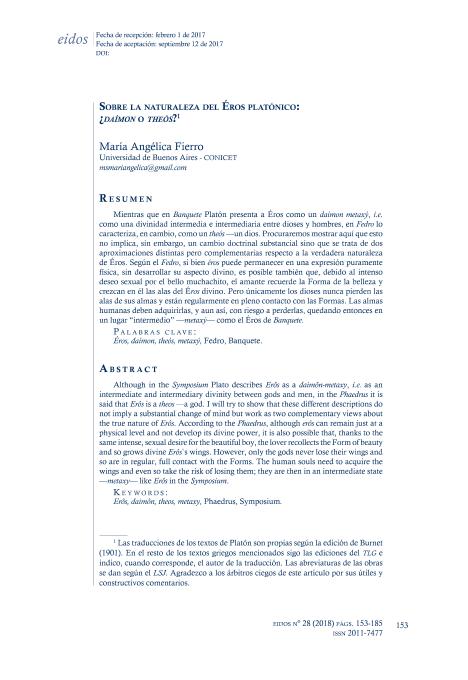Mostrar el registro sencillo del ítem
dc.contributor.author
Fierro, Maria Angelica

dc.date.available
2019-04-08T20:07:09Z
dc.date.issued
2017-12
dc.identifier.citation
Fierro, Maria Angelica; Sobre la naturaleza del Éros platónico: ¿daímon o theós?; Universidad del Norte; Eidos; 28; 12-2017; 153-185
dc.identifier.issn
2011-7477
dc.identifier.uri
http://hdl.handle.net/11336/73491
dc.description.abstract
Mientras que en Banquete Platón presenta a Éros como un daímon metaxý, i.e. como una divinidad intermedia e intermediaria entre dioses y hombres, en Fedro lo caracteriza, en cambio, como un theós -un dios. Procuraremos mostrar aquí que esto no implica, sin embargo, un cambio doctrinal substancial sino que se trata de dos aproximaciones distintas pero complementarias respecto a la verdadera naturaleza de Éros. Según el Fedro, si bien éros puede permanecer en una expresión puramente física, sin desarrollar su aspecto divino, es posible también que, debido al intenso deseo sexual por el bello muchachito, el amante recuerde la Forma de la belleza y crezcan en él las alas del Éros divino. Pero únicamente los dioses nunca pierden las alas de sus almas y están regularmente en pleno contacto con las Formas. Las almas humanas deben adquirirlas, y aun así, con riesgo a perderlas, quedando entonces en un lugar “intermedio” -metaxý- como el Éros de Banquete.
dc.description.abstract
Although in the Symposium Plato describes Erôs as a daimôn-metaxy, i.e. as an intermediate and intermediary divinity between gods and men, in the Phaedrus it is said that Erôs is a theos —a god. I will try to show that these different descriptions do not imply a substantial change of mind but work as two complementary views about the true nature of Erôs. According to the Phaedrus, although erôs can remain just at a physical level and not develop its divine power, it is also possible that, thanks to the same intense, sexual desire for the beautiful boy, the lover recollects the Form of beauty and so grows divine Erôs`s wings. However, only the gods never lose their wings and so are in regular, full contact with the Forms. The human souls need to acquire the wings and even so take the risk of losing them; they are then in an intermediate state —metaxy— like Erôs in the Symposium.
dc.format
application/pdf
dc.language.iso
spa
dc.publisher
Universidad del Norte
dc.rights
info:eu-repo/semantics/openAccess
dc.rights.uri
https://creativecommons.org/licenses/by-nc-sa/2.5/ar/
dc.subject
Daímon
dc.subject
Theós
dc.subject
"Fedro"
dc.subject
"Banquete"
dc.subject.classification
Otras Filosofía, Étnica y Religión

dc.subject.classification
Filosofía, Ética y Religión

dc.subject.classification
HUMANIDADES

dc.title
Sobre la naturaleza del Éros platónico: ¿daímon o theós?
dc.title
On the Nature of the Platonic Erôs: Daimôn or Theos?
dc.type
info:eu-repo/semantics/article
dc.type
info:ar-repo/semantics/artículo
dc.type
info:eu-repo/semantics/publishedVersion
dc.date.updated
2019-04-03T13:15:10Z
dc.journal.number
28
dc.journal.pagination
153-185
dc.journal.pais
Colombia

dc.journal.ciudad
Barranquilla
dc.description.fil
Fil: Fierro, Maria Angelica. Consejo Nacional de Investigaciones Científicas y Técnicas; Argentina. Universidad de Buenos Aires; Argentina
dc.journal.title
Eidos
dc.relation.alternativeid
info:eu-repo/semantics/altIdentifier/url/http://rcientificas.uninorte.edu.co/index.php/eidos/article/view/9557
dc.relation.alternativeid
info:eu-repo/semantics/altIdentifier/url/http://ref.scielo.org/shzpd4
Archivos asociados
